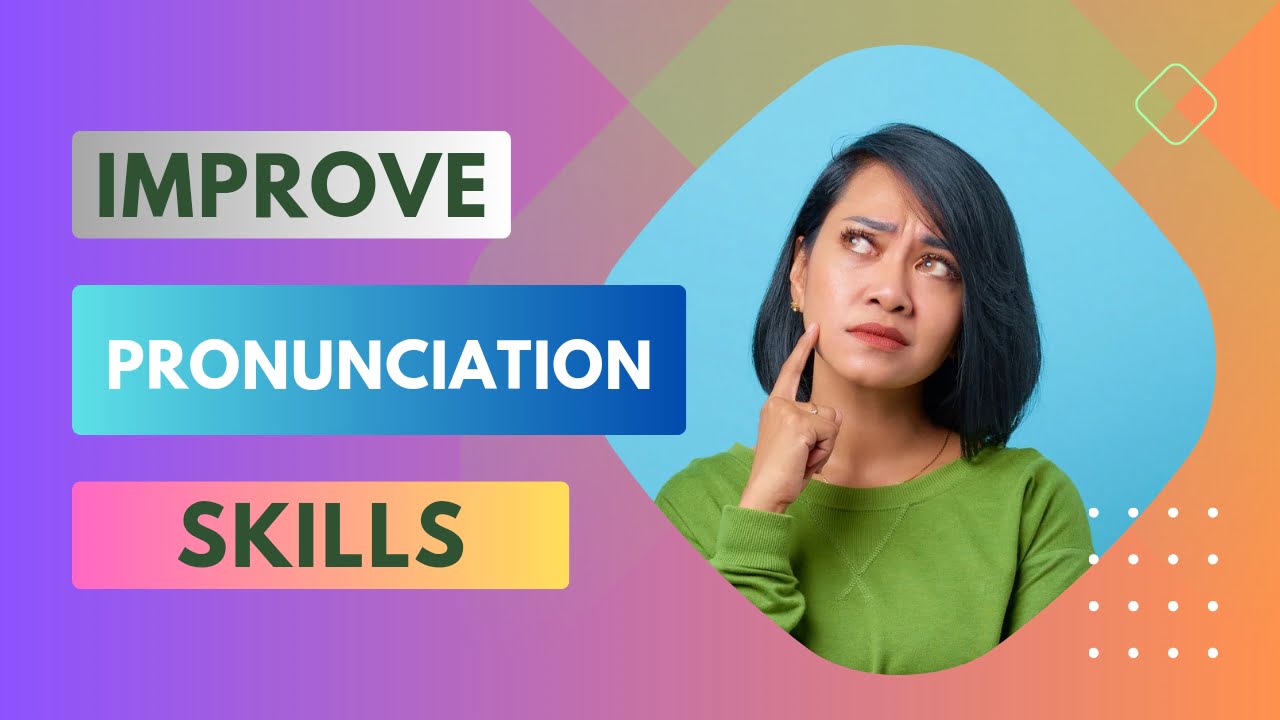Pronunciation is one of the most important aspects of learning a new language. It affects your ability to communicate clearly and confidently with native speakers, as well as your listening comprehension and accent. However, many learners struggle with improving their pronunciation skills, especially when they have limited exposure to the target language. In this blog post, we will share some effective ways to improve your pronunciation skills, whether you are a beginner or an advanced learner of English.
Introduction
English pronunciation is not easy to master. There are many sounds, rules, and exceptions that can confuse and frustrate learners. Moreover, there are different varieties of English, such as American, British, Australian, and Indian, that have different accents and pronunciations. Therefore, it is important to have a clear goal and a realistic expectation when you want to improve your pronunciation skills. You should not aim to sound exactly like a native speaker, but rather to speak clearly and intelligibly, and to reduce your foreign accent. To achieve this, you need to practice regularly and consistently, and to use various methods and resources that can help you improve your pronunciation skills.
In this section, we will discuss 10 different ways to improve your pronunciation skills. These are:
1. Listen to native speakers
One of the best ways to improve your pronunciation skills is to listen to native speakers as much as possible. This will help you to familiarize yourself with the sounds, rhythms, and intonations of English, and to notice the differences between your own pronunciation and the native speakers’. You can listen to various sources of authentic English, such as podcasts, audiobooks, radio, TV shows, movies, songs, and online videos. You can also use subtitles or transcripts to help you understand what you hear, and to check the spelling and pronunciation of unfamiliar words.
2. Imitate native speakers
Another effective way to improve your pronunciation skills is to imitate native speakers. This means to copy their speech as closely as possible, including their sounds, stress, intonation, and pauses. You can do this by repeating after them, either aloud or in your head, and by recording yourself and comparing your pronunciation with theirs. You can use the same sources of authentic English that you use for listening, or you can use specific materials that are designed for pronunciation practice, such as shadowing exercises, dialogues, and tongue twisters.
3. Learn the phonetic alphabet
The phonetic alphabet is a system of symbols that represent the sounds of a language. It can help you to learn the correct pronunciation of words, especially when the spelling and the sound do not match. For example, the word “through” is spelled with six letters, but it has only one sound, which is represented by the symbol /θruː/ in the phonetic alphabet. You can find the phonetic transcription of words in dictionaries, online tools, or apps, and you can use them to learn how to pronounce new words or to check your pronunciation of familiar words.
4. Learn the rules of pronunciation
English pronunciation is not completely random. There are some rules and patterns that can help you to pronounce words correctly, or at least to make an educated guess. For example, there are rules for the pronunciation of plural nouns, past tense verbs, word stress, syllable division, and silent letters. You can learn these rules from grammar books, online resources, or teachers, and you can apply them to your pronunciation practice. However, you should also be aware that there are many exceptions and variations to these rules, and that you need to memorize them or learn them from exposure.
5. Focus on the sounds that are difficult for you
Some sounds in English may be more difficult for you than others, depending on your native language and your level of proficiency. For example, you may have trouble with the /θ/ and /ð/ sounds (as in “think” and “this”), the /r/ and /l/ sounds (as in “red” and “led”), or the /ɪ/ and /iː/ sounds (as in “ship” and “sheep”). You should identify the sounds that are challenging for you, and focus on improving them. You can do this by listening to and imitating words and sentences that contain these sounds, by practicing minimal pairs (words that differ only by one sound, such as “bit” and “beat”), and by using articulation exercises (exercises that help you to produce the sounds correctly with your mouth, tongue, and teeth).
6. Pay attention to word stress, sentence stress, and intonation
Pronunciation is not only about individual sounds, but also about how they are combined and emphasized in words, sentences, and longer utterances. Word stress is the way that one syllable in a word is pronounced louder, longer, and higher than the other syllables. For example, in the word “pronunciation”, the third syllable is stressed, and it sounds like /prəˌnʌn.siˈeɪ.ʃən/. Sentence stress is the way that some words in a sentence are pronounced louder, longer, and higher than the other words. For example, in the sentence “I want to improve my English pronunciation”, the words “want”, “improve”, and “pronunciation” are stressed, and they carry the main meaning of the sentence. Intonation is the way that the pitch of your voice changes when you speak. For example, when you ask a yes-no question, your intonation usually rises at the end of the sentence, as in “Do you want to improve your English pronunciation?” These features of pronunciation are important for conveying meaning, emotion, and attitude, and for making your speech sound natural and fluent.
7. Use a mirror or a video camera
A mirror or a video camera can be useful tools for improving your pronunciation skills. They can help you to see how you produce the sounds of English, and to compare your mouth movements with those of native speakers. You can use a mirror or a video camera to practice in front of them, and to watch yourself as you speak. You can also record yourself and watch the playback, and look for any errors or areas of improvement. You can also use a mirror or a video camera to check your facial expressions and gestures, and to make sure that they match your tone and intention.
8. Get feedback from others
Feedback from others is essential for improving your pronunciation skills. It can help you to identify your strengths and weaknesses, and to correct your mistakes. You can get feedback from various sources, such as teachers, tutors, classmates, friends, or online platforms. You can ask them to listen to your speech, and to give you comments, suggestions, or corrections. You can also ask them to rate your pronunciation on a scale of 1 to 10, or to use a rubric that evaluates different aspects of your pronunciation, such as clarity, accuracy, fluency, and naturalness.
9. Use online tools and apps
Online tools and apps can be very helpful for improving your pronunciation skills. They can provide you with various features and functions, such as audio recordings, phonetic transcriptions, pronunciation rules, quizzes, games, and exercises. They can also give you instant feedback, scores, or progress reports. Some examples of online tools and apps that you can use are:
[BING PRONUNCIATION]: This is a web-based tool that allows you to type or paste any word or sentence, and to hear how it is pronounced by a native speaker. You can also see the phonetic transcription and the word stress of the word or sentence, and you can choose between different varieties of English, such as American, British, or Australian.
[ELSA SPEAK]: This is a mobile app that helps you to improve your pronunciation skills through personalized lessons, exercises, and feedback. You can learn how to pronounce over 2000 common words and phrases, and you can practice with real-life scenarios, such as introducing yourself, ordering food, or making a phone call. You can also get feedback on your pronunciation accuracy, fluency, and intonation, and you can track your progress and improvement.
[SOUNDS: THE PRONUNCIATION APP]: This is a mobile app that helps you to learn the sounds of English, and to improve your pronunciation skills. You can learn the phonetic alphabet, and you can listen to and record the sounds of English. You can also practice with interactive exercises, such as sound recognition, word recognition, and word stress. You can also test your pronunciation skills with quizzes, and you can compare your results with other learners.
10. Have fun with pronunciation
The last but not least way to improve your pronunciation skills is to have fun with pronunciation. Pronunciation can be enjoyable and entertaining, and you can use various activities and games to make it more interesting and engaging. For example, you can:
Sing along to your favorite songs in English, and try to imitate the singer’s pronunciation, stress, and intonation.
Watch comedy shows or movies in English, and try to copy the actors’ accents, expressions, and jokes.
Read aloud tongue twisters, poems, or stories in English, and try to pronounce them as fast and as clearly as possible.
Play word games, such as rhyming words, homophones, or anagrams, and try to pronounce them correctly and quickly.
Challenge yourself or your friends to pronounce difficult or funny words or sentences in English, and see who can do it better or faster.
Conclusion:
Improving your pronunciation skills in English is a rewarding journey that significantly contributes to effective communication. The nuances of pronunciation go beyond individual sounds, extending to word stress, sentence stress, and intonation. While the path to mastering pronunciation may seem challenging, the diverse strategies discussed in this blog post offer a comprehensive approach suitable for learners at all levels.
Remember, the goal is not necessarily to sound exactly like a native speaker but to communicate clearly and intelligibly, reducing your foreign accent. Whether you’re a beginner or an advanced learner, integrating these methods into your language-learning routine can make a substantial difference in your pronunciation skills.
From listening to native speakers and imitating their speech to delving into the phonetic alphabet, learning rules, and focusing on challenging sounds, each approach plays a vital role in your pronunciation improvement. Additionally, utilizing tools like mirrors, video cameras, and online apps enhances self-awareness and provides valuable feedback.
Don’t forget the importance of having fun with pronunciation. Engaging in enjoyable activities, such as singing along to songs, watching English comedy, and playing word games, not only adds an element of enjoyment but also makes the learning process more dynamic and memorable.
As you embark on your journey to refine your pronunciation skills, consider exploring online platforms and apps designed specifically for pronunciation practice. These tools offer a combination of personalized lessons, exercises, and instant feedback, aiding in a more structured and interactive learning experience.
Lastly, seeking feedback from others, be it teachers, peers, or online communities, completes the circle of improvement. External input helps you identify areas of strength and weakness, ensuring a well-rounded approach to mastering English pronunciation.
Now, over to you! Which of these strategies resonates with you, and how do you plan to incorporate them into your pronunciation improvement journey? Share your thoughts, experiences, and any additional tips you may have in the comments below. Let’s build a community of learners committed to refining their English pronunciation skills together.
Discover more from Gyankundli
Subscribe to get the latest posts sent to your email.


















